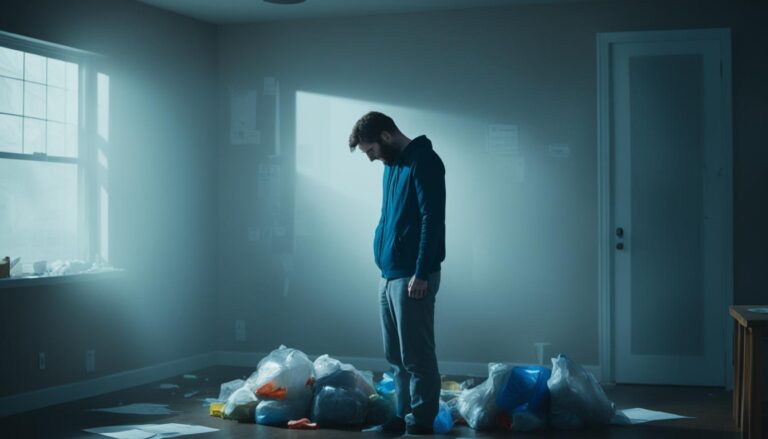Depression is a common mental health issue that can greatly affect someone’s daily life. It’s important to know the symptoms of depression to help those who might be struggling. This guide is a detailed depression guide, offering insights into the emotional and physical signs of depression. These signs include feeling sad and irritable, or losing interest in activities you once loved.
According to the World Health Organization, depression impacts about 280 million people worldwide. Even mild symptoms can make daily life hard, leading to feelings of hopelessness and worthlessness. This guide aims to highlight the various signs of depression and encourage people to get help when needed. It shows that depression can be treated.
Key Takeaways
- Depression affects an estimated 280 million people worldwide.
- Understanding the symptoms is crucial for early recognition and treatment.
- Symptoms can be emotional, physical, or a combination of both.
- It is treatable with the right support and resources.
- Awareness of the signs can lead to timely intervention.
What is Depression?
Depression is a serious mental health issue that changes how people feel, think, and do daily tasks. In the U.S., about 16.2 million adults, or 6.7% of adults, deal with depression yearly. They must have symptoms for at least two weeks to be diagnosed.
There are different types of depression, each with its own set of symptoms. Major depressive disorder is the most common type. Persistent depressive disorder, or dysthymia, is another type with less severe symptoms that last over two years.
Perinatal depression affects about 1 in 9 women during pregnancy or after giving birth. Seasonal affective disorder starts in late fall and affects around 5% of adults.
Severe depression can include psychosis, where people see or hear things that aren’t there. People with bipolar disorder go through both depressive and manic episodes. Depression can also affect children and women, leading to conditions like disruptive mood dysregulation disorder and premenstrual dysphoric disorder.
Knowing about these types helps in finding the right treatment. For more info on what causes mood disorders, including anxiety, check out this informative source.
Understanding the Symptoms of Depression
It’s key to know the signs of depression to help someone. This mental health issue shows in many ways, affecting how someone feels and acts. By spotting these signs, people can start to get better.
Emotional Symptoms
Feeling down is a big sign of depression. Look out for these emotional signs:
- Persistent sadness: Feeling empty or unhappy for a long time.
- Hopelessness: Thinking things won’t get better, making it hard to try.
- Irritability: Getting easily upset or angry over small things.
- Feelings of worthlessness: Always feeling not good enough or guilty for no reason.
Physical Symptoms
Depression can also show in physical ways. These signs are hard to ignore:
- Fatigue: Feeling very tired that rest doesn’t help.
- Sleep disturbances: Trouble sleeping or staying asleep, making you tired during the day.
- Changes in appetite: Eating more or less because of changed habits.
- Unexplained aches or pains: Physical pain with no clear cause.
Common Signs of Depression
It can be hard to spot the signs of depression, but it’s key for mental health. Knowing these signs helps people check their feelings and actions. This makes it easier to get help when needed.
Persistent Sadness
Feeling sad for a long time is a big sign of depression. This sadness can make everyday tasks hard and may feel hopeless. Spotting this feeling early can help get the right support.
Loss of Interest in Activities
Not wanting to do things you used to enjoy is another sign. People might stop doing hobbies or hanging out with friends. This shows a big emotional fight, and it’s important to have support from others.
Changes in Sleep Patterns
Changes in sleep are a key sign of depression. You might have trouble sleeping or sleep too much and feel tired. These sleep changes make other symptoms worse and make daily life harder.
Symptoms of Depression: A Guide
It’s key to know the signs of depression to catch it early and get help. About 5 percent of Americans, or 15 million people, feel depression’s effects each year. Spotting these signs can greatly improve well-being for individuals and those close to them.
Depression shows in many ways. Many feel emotional symptoms like ongoing sadness, being easily annoyed, or feeling hopeless. Others might notice physical symptoms, such as feeling very tired, eating differently, or having pain without a clear cause. Sadly, one in six people will face depression at some point, showing how common it is.
Seasonal Affective Disorder (SAD) is a type of depression linked to the seasons, often hitting in the fall. Knowing the signs of SAD can lead people to seek help faster. There are many treatments, like different types of therapy and medicines like SSRIs and SNRIs. Studies show therapies like Behavioral Activation Therapy and Cognitive Behavioral Therapy (CBT) are very effective against depression.

For those with Treatment-Resistant Depression (TRD), new treatments are being tried. Esketamine and Electroconvulsive Therapy (ECT) are showing hope for those who haven’t found relief with usual treatments. It’s vital to know all symptoms and treatment options to handle mental health issues well. For more on mental health and inheritance, check out this resource.
| Type of Symptoms | Examples |
|---|---|
| Emotional Symptoms | Sadness, Irritability, Hopelessness |
| Physical Symptoms | Fatigue, Appetite Changes, Aches |
| Seasonal Symptoms | Seasonal Affective Disorder (SAD) |
Diversity in Depression Symptoms
It’s important to understand how depression shows up differently in people. Things like gender and age can change how depression looks. This makes it harder to spot and treat.
How Symptoms Differ by Gender
Men and women often show depression in different ways. Men might get irritable or use more substances. Women tend to feel sad and pull away from others. Knowing these differences helps in getting the right help and treatment.
Symptoms in Children vs. Adults
Kids with depression act out in ways adults don’t. They might throw tantrums or get easily upset. Spotting these signs early helps in treating them right.
| Demographic | Common Symptoms | Unique Considerations |
|---|---|---|
| Men | Irritability, increased substance use | May underreport symptoms due to stigma |
| Women | Sadness, withdrawal | More likely to seek help |
| Children | Behavioral issues, irritability | Symptoms often overlooked as normal behavior |
| Adults | Sadness, fatigue, loss of interest | May mask symptoms with responsibilities |
Depression affects people in many ways, making mental health education key. Knowing these differences helps in finding the right treatment.
For more on handling similar symptoms, check out this guide to anxiety management. It’s important to understand how anxiety and depression are linked for better mental health care.
Recognizing Severe Depression Symptoms
Severe depression symptoms show the need for quick action. People with these symptoms may feel deep sadness and think about harming themselves or ending their life. It’s important to spot these signs to get help and treatment fast.
Thoughts of Self-Harm or Suicide
Severe depression can lead to thoughts of harming oneself or ending one’s life. These thoughts can come with sudden actions or big mood changes. Sadly, about 46,000 people in the U.S. take their own lives each year, possibly more since not all cases are reported.
Those who don’t get treatment might try to end their life. Signs include talking about wanting to die, feeling hopeless, and doing risky things.
Increased Substance Use
Another sign of severe depression is using more substances to cope. Research shows that 33% to 69% of suicide victims had alcohol in their system. Using substances can make depression worse and increase the risk of acting on suicidal thoughts.
It’s key to know how substance abuse and mental health are linked. Both can make depression symptoms worse. Getting help is vital if you’re thinking about harming yourself or using more substances.
Looking for help is important. You can reach out to a primary care doctor, psychiatrist, or mental health expert. They can offer the support and help you need to deal with depression.
The Impact of Depression on Daily Life
Depression can really change how we live our daily lives. It affects work and relationships. People may struggle to stay productive at work because of mental health issues. This can make them feel isolated, making social interactions harder.
Effects on Work and Productivity
At work, those with depression often find it hard to focus and be efficient. Depression can last for weeks or even months. This can lead to:
- Increased absenteeism due to emotional distress.
- Difficulty in completing tasks, leading to missed deadlines.
- Lack of motivation, causing a decline in work quality.
- Challenges in collaborating effectively with colleagues.
This can not only affect personal success but also the team and the whole organization.
Interpersonal Relationships
Depression also impacts our relationships with others. People may pull away from friends and family. Symptoms include:
- Feelings of hopelessness that make it hard to connect with others.
- Increased irritability leading to conflicts with family and friends.
- A lack of interest in activities that used to be fun, straining connections.
Keeping relationships healthy becomes tough, which can make us feel lonelier. Understanding these effects shows why getting help is crucial.
| Impact Area | Examples of Effects |
|---|---|
| Work | Decreased performance, increased absenteeism |
| Social Life | Withdrawal from friends, conflicts with family |
| Overall Well-Being | Increased feelings of isolation, decreased quality of life |
Coping with Depression Symptoms
Understanding how to deal with depression is key. It’s important to know how to take care of yourself and the value of having people around you. Using different methods can make you stronger emotionally and improve your overall health.
Self-Care Strategies
Adding self-care to your daily life can really help with depression. Here are some ways to try:
- Physical Activity: Regular exercise, like walking, swimming, or dancing, can be as good as medicine for feeling better. Try to get in 30 minutes of activity each day.
- Nutrition: Eating well, with lots of lean meats, veggies, and whole grains, can make you feel better. Pay attention to how much you eat, as depression can change your appetite.
- Sleep Hygiene: Having a regular sleep schedule can help with sleep problems that come with depression. Try to get about eight hours of good sleep each night.
- Mindfulness Practices: Doing yoga, meditation, or deep breathing can help you feel emotionally better. It also helps you connect with yourself and the world around you.
- Gratitude Journaling: Writing down things you’re thankful for can have a big positive effect on your mental health. It helps you focus on the good things in life.
The Importance of Social Support
Having people around you is crucial when you’re dealing with depression. Being with friends and family can make you feel less alone. Here are some ways to build those connections:
- Join group activities or classes to meet new people.
- Try volunteering, like walking dogs at a shelter, for exercise and social time.
- Work out with a friend to stay motivated and have support.
- Talking regularly with loved ones can make you feel better. It lets you share your feelings and experiences.
Risk Factors Contributing to Depression Symptoms
Understanding what can lead to depression is key. Both genes and life events play a big part in it. Knowing these factors helps spot depression early and start treatment.
Genetic Factors
Genetics greatly affect our chance of getting depression. About 40% of depression cases come from genes. If a family member had it, you’re more likely to too.
Women are more likely to get major depression than men. This could be why depression often runs in families.
Life Events and Stressors
Life changes can trigger depression. The World Health Organization says 5% of men and 9% of women face depression yearly. Events like losing someone close or big life changes can lead to it.
What we eat and some medicines can also make depression more likely. Family history matters too. If your family has struggled with depression, you might face it too.
When to Seek Help for Depression Symptoms
Knowing when to get help for depression is key to getting better. Many people feel a lot of mental health symptoms that make everyday life hard. Getting help early can really help improve how you feel.
Consulting a Healthcare Provider
If you notice depression symptoms that stop you from doing daily tasks, think about seeing a healthcare provider. Signs like feeling sad for a long time, losing interest in things you used to love, or having trouble focusing are reasons to get help. Getting help can lead to a treatment plan that fits your needs.
For serious depression, a mix of therapy and medicines like antidepressants works best. These medicines can take a few weeks to start working, and your doctor might change them if needed. Making healthy changes, like exercising and eating well, can also help your mental health.

Exploring Treatment Options for Depression
When dealing with depression, treatment usually combines psychotherapy and medication. Finding the right mix can greatly improve a person’s life. There are many types of therapy and medicines, each designed for different needs.
Psychotherapy Approaches
Talk therapy, or psychotherapy, is a key part of treating depression. It helps people feel better by changing their thoughts and actions. Here are some common types:
- Cognitive Behavioral Therapy (CBT): This method helps change negative thoughts and actions linked to depression.
- Interpersonal Psychotherapy (IPT): Focuses on improving relationships and communication to tackle issues like grief and conflicts.
- Psychoanalytic Therapy: A long-term approach that looks into the past to understand what causes depression.
- Systemic Therapy: Works on improving personal and family relationships to help with depression.
Psychotherapy can take weeks or months, often needing 20 to 24 sessions for CBT and 16 to 20 for IPT. Therapists may also offer extra sessions to help keep up the progress made in therapy.
Role of Medications
Medicines are also a big part of treating depression. There are many antidepressants, each one working in a different way to balance brain chemicals:
- Selective Serotonin Reuptake Inhibitors (SSRIs): These are seen as safer with fewer side effects.
- Serotonin-Norepinephrine Reuptake Inhibitors (SNRIs): These target serotonin and norepinephrine to help with depression.
- Atypical Antidepressants: Improve mood through different mechanisms.
- Tricyclic Antidepressants & Monoamine Oxidase Inhibitors (MAOIs): Used for more severe depression.
Adding other medicines like mood stabilizers or antipsychotics can make treatment work better. It might take trying a few medicines to find the right one. It’s important to watch for side effects and to slowly stop taking the medicine when it’s time.
New Trends in Depression Treatment
The way we treat depression is changing with new therapies. These new treatments help with the growing number of people affected by depression. In the US, about 9% of adults deal with depression every year.
Older treatments still work well, but new ones are key for those who don’t get better with traditional care. These new treatments are vital for people with treatment-resistant depression and other mental health issues.
Innovative Therapies
New treatments like brain stimulation and intranasal esketamine are getting attention. They offer quick help for those who haven’t found relief with usual treatments. Brain therapies, such as TMS and ECT, change brain circuits to help with depression.
Intranasal esketamine is a fast-acting treatment for depression, especially for those who haven’t responded to other meds. Studies show that combining it with therapy can lead to better results. This could mean more relief from symptoms.
As we learn more about mental health, we can create more personalized treatment plans. Research into different therapies helps us find the best ways to treat depression. The ongoing work on new treatments offers hope for tackling depression worldwide.

Conclusion
This mental health guide shows how vital it is to spot and deal with depression symptoms. Depression is the top cause of disability globally, affecting millions and leading to nearly 40,000 suicides each year in the U.S. It’s key to know that depression hits different groups hard, like women who often feel it more than men. Many in underrepresented groups also hesitate to get help.
It’s found that about half of those with depression don’t get better with the first treatment. This underlines the need to try different treatments. Taking steps towards mental wellness is crucial. If you’re feeling down or losing interest in things, getting professional help is a step in the right direction. This guide offers valuable advice to help you and others facing these issues.
Overcoming the stigma around mental health and creating supportive communities is key. This guide aims to bring hope and empower those with depression to start their path to recovery and better life quality.


